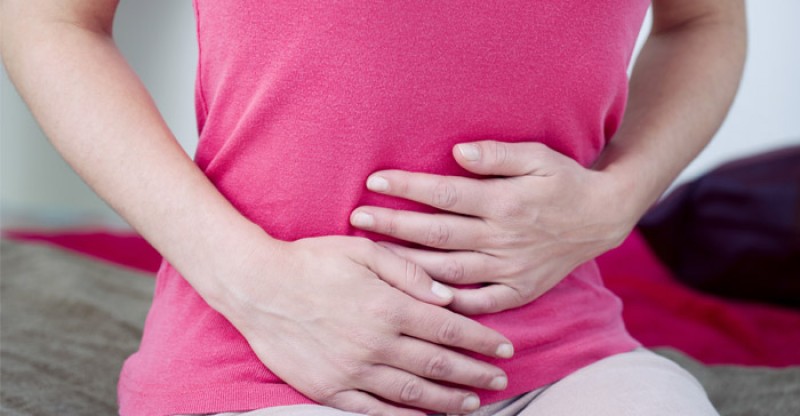17 Natural Ways to Get Rid of Gas and Gas Pain
Many adults wonder how to get rid of bloating, and how to relieve gas.
Gas and bloating are common complaints among people of all ages.
Gas can be incredibly painful, seriously affecting a person’s ability to execute everyday tasks.
Gas pain and bloating can negatively impact a person’s quality of life, as these symptoms make it difficult to enjoy certain activities.
Plus, excessive gas and bloating can be embarrassing, as they often result in burping and flatulence.
About 30 percent of adults suffer from chronic gas and bloating.
Often, a stomachache is the result of excess gas.
This pain can stretch from behind the chest all the way down to the pelvic region.
Gas pain is characterized as a dull pain that coincides with sudden, sharp cramps.
When someone is experiencing significant gas pain, it can be difficult just to move, breathe, and speak.
Bloating is the result of excess gas in the abdomen. A bloated abdomen will feel hard and tight.
Those who are bloated will often experience discomfort as the gas fills up the digestive tract.
Many people will also have a distended abdomen, meaning that the abdomen sticks out due to the excess gas inside of it.
What Causes Gas Pain and Bloating?
There are numerous factors that contribute to gas pain and bloating.
Many people will experience gas pain and bloating as the result of dietary factors.
These factors include:
- Constipation: Constipation, or the inability to produce a bowel movement, can make it difficult for the body to let out gas.
- Dairy intolerance: People who are lactose-intolerant, meaning that their body cannot process dairy, will often experience excess gas and bloating as the result of consuming dairy products. This is because the person’s body cannot separate the sugars in dairy products properly.
- Gluten intolerance: Those who have an intolerance to gluten, which is found in wheat, oats, and other grains, will often experience excess gas, as the body has a difficult time processing the gluten.
- Sensitivity to artificial sweeteners: Artificial sweeteners like xylitol and mannitol are found in numerous foods such as candy and diet beverages. Many people are intolerant of these substances, and their body will produce excess gas as the result of consuming these ingredients.
- Underlying health condition: Some people produce excess gas as the result of an underlying health condition that affects the digestive system. Some of these conditions include ulcerative colitis, Crohn’s disease, and diverticulitis. Diabetics may also experience gas and bloating because their small intestine has many bacteria.
- Swallowing air: We all swallow air from time to time. While we eat, drink, and chew gum, small amounts of air enter our digestive tract. This air turns into the gas when it enters the intestines.
- Excessive fiber intake: While fiber is an important part of a nutritious diet, fiber can be the culprit behind excessive gas. Fiber helps manage cholesterol levels and encourages regular, healthy bowel movements. It can be found in most plant-based foods, grains, and beans. Fiber may also be consumed in the form of a supplement like Metamucil.
- Carbonated beverages: Drinks like soda, beer, and seltzer are carbonated, meaning that they have tiny air bubbles. When you consume these air bubbles, excess air enters the digestive tract, which can lead to gas and bloating.
What are the Symptoms of Gas and Bloating?
Excess gas and bloating can result in the following symptoms:
- Abdominal distention
- Painful stomach and abdominal cramps
- Dull pain throughout the digestive tract
- Excessive burping
- Frequent passing of gas
- Feelings of tightness in the digestive tract
- An abdomen that feels hard to the touch
- Unusual noises coming from the abdomen, as gases move around
How Can I Prevent Gas Pain and Bloating?
There are many habits that you can adjust in order to reduce gas pain and bloating.
Some ways to prevent gas pain and bloating are:
- Chewing food more thoroughly: By chewing food more thoroughly, you will allow the enzymes in your saliva to break down the food before it gets to your digestive tract. Food that has not been properly broken down will produce greater amounts of gas as it moves along the digestive tract.
- Sip beverages slowly: Gulping beverages allows excess air to enter your mouth and be swallowed. Swallowing large amounts of air will create pockets of gas inside your digestive tract.
- Avoid carbonated beverages: Carbonated beverages such as soda and beer contain bubbles of gas. These bubbles will enter the digestive tract and can lead to enormous gas pain and bloating.
- Move around: If you are someone who likes to sit around instead of staying active, gas and food will move more slowly through your digestive tract. Exercise encourages the digestive system to move food along more quickly, preventing gas from developing.
- Avoid foods that trigger gas: Some people may be sensitive to foods that are spicy or fried. If certain foods seem to trigger painful gas and bloating, avoid these foods as much as possible.
Remedies for Gas Pain and Bloating
While gas pain and bloating can be agonizing, there are several remedies that can deliver quick relief to your digestive tract and dissipate gas effectively.
This list will show you how to get rid of bloating, and gas pains, fast.
Peppermint Tea
If you want to know how to get rid of gas pains, peppermint is one of the most effective methods.
Peppermint contains a chemical called menthol that soothes nerves affected by pains related to the digestive tract.
It also has antispasmodic properties to relieve gas quickly.
Additionally, peppermint can quickly ease symptoms of anxiety that can exacerbate stomach and abdominal pain.
Directions:
All you need for this remedy is a bag of natural peppermint tea and some water.
Heat up a drinking mug’s worth of water until it is almost boiling and you can see tiny bubbles rising to the surface.
Place the peppermint tea bag into the hot water and cover the mug quickly.
Allow the tea to steep for 15 minutes.
Then, while the tea bag is still in the mug, press against the bag firmly with a spoon to force more tea into the water.
Discard the tea bag.
If the tea is too hot to drink, either place a large metal spoon into the mug to absorb some of the heat or place an ice cube or two directly into the mug.
Do not add sugar to this remedy, as sugar can exacerbate gas pains.
Ginger Tea
Like peppermint, ginger is a natural substance that can quickly and dramatically reduce gas pains and bloating.
Ginger has been used for centuries to treat pains associated with gas.
Ginger also treats nausea and heartburn.
Ginger contains gingerols and shogaols, two compounds that have significant anti-inflammatory properties.
Ginger dislodges gas that is stuck in the digestive tract to provide quick relief.
Directions:
To make this remedy, you will need one medium-sized root of fresh ginger, the juice of one lemon, honey, and water.
Scrub the ginger root under running water like you would a potato.
Chop the ginger root into several half-inch chunks. Place these chunks into a large mug.
Meanwhile, boil a full cup of water.
When the water is forming tiny bubbles on the surface, pour the water into the mug, over the ginger.
Add the lemon and honey, and let this combination steep for 10 minutes while covered.
Then, strain the mixture into a new mug to remove the ginger chunks.
You can drink this tea several times a day after eating a large meal.
Go for a Stroll
If you commonly experience gas pain and bloating after eating, sitting in a chair or lying down will only prolong this problem.
Pockets of air in the digestive tract will most often remain trapped if your body is not in motion.
Studies have proven that exercise can eliminate gas and bloating.
That’s because physical motion agitates these pockets of air in the digestive tract and forces them to move along more quickly.
Just 10 to 15 minutes of physical activity can dramatically reduce bloating and gas pain.
Taking a walk after mealtime is a great way to get in some physical activity to reduce these symptoms.
Cilantro
Cilantro aids digestion by alleviating indigestion, heartburn, bloating, and gas, thanks to its carminative properties.
Its seeds are called coriander and are equally beneficial.
Directions:
Place 10 coriander seeds in a small frying pan.
Turn the heat on to medium and toast the seeds just until they become aromatic.
Pour the seeds into a glass of buttermilk.
Another remedy is to add one teaspoon of dried cilantro leaves to a glass of water to make a tea.
Heat up the mixture until tiny bubbles reach the liquid’s surface.
Allow this to steep for ten minutes before straining.
Chamomile Tea
Chamomile has been used for centuries as a digestive aid.
Its calming properties can significantly reduce gas pain and bloating by dissolving the gas in the stomach.
It can also reduce heartburn and relieve indigestion.
Heat a cup of water until just before it begins to boil.
Pour this into a hot mug containing a bag of natural chamomile tea.
Add some honey and lemon juice to taste, and allow this mixture to steep for 15 minutes while covered.
Be sure to avoid adding milk, as the lactic acid in milk can aggravate the digestive system even more.
Fennel Seeds
Fennel seeds are great for diminishing gas that is in the upper digestive tract.
This type of gas affects the stomach and can trigger heartburn.
Fennel seeds can quickly relieve the pain associated with this type of gas.
The natural oils in fennel also control flatulence and pains associated with acid reflux.
Directions:
Toast a large spoonful of fennel seeds in a small frying pan on medium heat until fragrant.
Remove the seeds from the heat and pour them into a glass of buttermilk.
You can also make a fennel tea with dried fennel leaves.
Heat water until it is almost boiling and is forming tiny bubbles on the surface.
Pour this into a mug, and add one large spoonful of dried fennel leaves.
Let this steep for 15 minutes.
Pumpkin
For those who want to know how to get rid of gas, pumpkin is an effective and delicious solution.
Pumpkin is full of enzymes that break down the food in our intestines quickly.
Gas can result from lingering food in the intestines, so pumpkin can relieve gas by getting this food out of your system faster.
The fiber in pumpkin will also relieve constipation, which can be a cause of excess gas and bloating.
Directions:
There are many different ways to consume pumpkin.
You can blend one can of pumpkin with plain Greek yogurt, cinnamon, and honey to make a delicious smoothie that will relieve gas.
The probiotics in the yogurt will balance your intestinal tract and relieve constipation.
You can also add steamed pumpkin to your dinner as a delicious side dish that will counteract gas and bloating.
Pumpkin is safe to consume on a daily basis.
Lemon Water
If you want to know how to get rid of gas, lemon is a quick and effective remedy.
There are numerous benefits to starting each day with a large glass of lemon water.
Lemon has antibacterial properties that can eradicate unhealthy bacteria in the gut that may cause gas and bloating.
Lemon also creates something called hydrochloric corrosive that breaks down food in the intestines, alleviating gas and bloating.
This helps relieve constipation as well, moving food through the digestive tract at a much faster rate.
Directions:
Heat up a glass of water until it is warm but not so hot that it is difficult to drink.
Add the juice of one lemon and stir. Drink it quickly.
If you don’t have fresh lemons, a few teaspoons of lemon juice will suffice.
Drink More Water
Sipping lots of water throughout the day is one of the best ways both to prevent and to relieve gas pain and bloating.
Water helps move everything along, pushing bubbles of gas out of the body as it travels through the digestive tract.
It’s important not to gulp water, however.
The action of gulping can cause you to swallow excess air, creating more gas.
Start a Workout Routine
Regular exercise will keep the gas in your body moving.
Sitting still allows gas to remain in the digestive tract, but moving around will agitate gas bubbles and move the food along with more quickly.
Thirty minutes of exercise each day will not only tremendously relieve and prevent gas and bloating, but it will also keep your entire body feeling healthy.
Regular exercise even alleviates symptoms of depression and anxiety.
Directions:
Spend 30 minutes each day exercising.
Find an exercise routine that works for you, whether it be jogging, yoga, or a physical activity like tennis.
Anise Seed
Anise seed has carminative properties, meaning that it can relieve gas and bloating fast.
This seed also calms down the digestive system, allowing food and gas to travel along the intestines more easily.
Anise seed can relieve agitated nerves that trap gas in the digestive tract.
Directions:
Add one spoonful of anise seeds to a cup of boiling hot water.
Allow this mixture to steep for fifteen minutes while covered.
Then, strain the mixture into a drinking mug and sip slowly.
You can drink this tea at any time of the day, and as frequently as you’d like.
Learn Some Breathing Exercises
Anxiety and stress can wreak havoc on your digestive system.
When we are anxious, we tense up the muscles and nerves in our body which can result in trapped gas.
Many people also swallow excess air when they are experiencing anxiety, which can result in excess gas in the digestive tract.
Breathing exercises are intended to calm the nerves and reduce feelings of stress and anxiety.
By taking the time each day to focus on your breathing, you can relieve the pain and discomfort associated with gas and bloating.
Directions:
Spend ten minutes each day taking long, deep breaths.
While you are taking these deep breaths, focus on the sensation in your abdomen.
You should feel quick relief from the pain and discomfort of gas and bloating.
Taking deep breaths after each meal will put your body in a relaxed state that can help digestion run more smoothly.
Cinnamon
Cinnamon can soothe the digestive tract and reduce indigestion.
Cinnamon has been shown to provide instant relief from the pain and discomfort associated with gas and bloating.
Cinnamon will also prevent the development of more gas in the digestive tract.
Directions:
Heat up two cups of water until the water is almost boiling.
Add two teaspoons of cinnamon powder and stir well.
Drink this tea daily in the morning to prevent the buildup of gas in the digestive tract.
You can also incorporate more cinnamon into your diet.
However, never take a spoonful of cinnamon powder on its own, as the fine powder consistency makes it difficult to swallow.
Lemon Juice and Baking Soda
Many commercial digestive aids use bicarbonate soda, or baking soda, as a leading ingredient.
The effervescence of baking soda quickly kills gas upon contact, providing instant relief from the pain and discomfort that is associated with gas and bloating.
This combination will quickly settle an upset stomach, and dissipate painful gas bubbles as soon as it has been swallowed.
Directions:
Pour two tablespoons of baking soda into a glass.
Then, add the juice of one half of a lemon. Fill the glass up with cold water and it will quickly bubble.
Drink this quickly, as the effervescence dissipates within minutes.
This mixture can be consumed several times throughout the day if you experience chronic gas pain and bloating.
Garlic
If you want to know how to get rid of bloating fast, stock up on some garlic.
Garlic is a miracle plant that contains antibacterial, anti-fungal, and anti-inflammatory properties.
By consuming garlic, you can heal many digestive illnesses that can cause gas and bloating.
Garlic also aids digestion, breaks down food that is stuck in the digestive tract, and moves gas along quickly.
Directions:
There are many ways to utilize garlic in order to relieve gas pain and bloating.
Raw garlic is always better to use because heating garlic causes some of its healing chemicals to evaporate.
Try grating raw cloves of garlic into your meal.
You can also try boiling garlic cloves in two cups of water and drinking this as a tea each morning.
Buttermilk
If you do not have an intolerance to lactose, buttermilk is a fantastic remedy for gas pain and bloating.
Buttermilk will reduce the inflammation of the intestines that can cause gas.
Adding sea salt and carom seeds or celery seeds to buttermilk will create a beverage that can combat gas and bloating fast.
Directions:
Add one teaspoon of sea salt and one teaspoon of carom seeds or celery seeds to a glass of buttermilk.
Drink this mixture twice a day to maintain good digestive health, and prevent gas pain and bloating.
Yogurt
Eating plain yogurt throughout the day will alleviate gas pain and bloating.
Yogurt contains probiotics that aid in the breaking down of food in the digestive system.
Probiotics deliver healthy bacteria to the intestines that eat away at gases and foods that may be stuck in the digestive tract.
Directions:
Start every morning off right with a bowl full of plain yogurt.
This will get your digestive system in shape so that it can fight gas for the remainder of the day.
Conclusion
If you are wondering how to get rid of bloating and how to relieve gas, this list is all that you need.
If you experience chronic gas pain and bloating, any of the methods listed above will provide fast and effective relief.
Gas and bloating can be embarrassing and even agonizing, but thanks to these natural remedies, you don’t have to suffer any longer.
FDA Compliance
The information on this website has not been evaluated by the Food & Drug Administration or any other medical body. We do not aim to diagnose, treat, cure or prevent any illness or disease. Information is shared for educational purposes only. You must consult your doctor before acting on any content on this website, especially if you are pregnant, nursing, taking medication, or have a medical condition.
HOW WOULD YOU RATE THIS ARTICLE?






